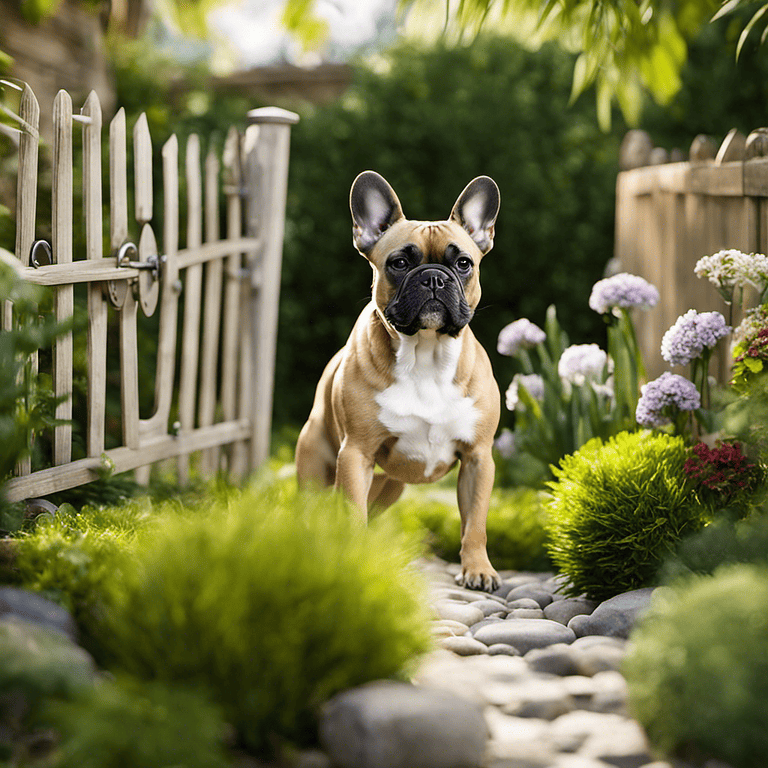French Bulldogs, with their charming snorts and endearing personalities, are beloved companions. Yet, even these delightful dogs can present challenging behaviors that test an owner’s patience. Have you found yourself wondering how to curb destructive chewing, or perhaps grappling with possessiveness stemming from jealousy? You’re not alone.
These are common French Bulldog behavior problems that, if left unaddressed, can disrupt the peace of your home and strain the bond you share with your furry friend. The good news? With understanding, consistent training, and the right strategies, you can transform these challenges into opportunities for growth and create a truly harmonious living environment in 2025 and beyond. In our experience, addressing these issues proactively not only solves problems but also deepens your relationship with your Frenchie.
Key Takeaways
- French Bulldogs often exhibit destructive behaviors and jealousy due to underlying issues like anxiety, boredom, or a lack of proper socialization.
- Effective management hinges on identifying the root cause and implementing targeted solutions, not just suppressing symptoms.
- Positive reinforcement is the cornerstone of all successful French Bulldog behavior modification, encouraging desired actions without fear.
- Establishing a consistent routine, providing ample mental and physical enrichment, and ensuring balanced attention are crucial for prevention.
- Don’t hesitate to seek professional guidance from a certified dog trainer or veterinary behaviorist for persistent or aggressive behaviors.
Table of Contents
- Understanding Common French Bulldog Behavior Problems
- Decoding Destructive Behavior in French Bulldogs
- Navigating French Bulldog Jealousy and Possessiveness
- Holistic Approach: Training, Socialization, and Routine
- When to Seek Professional Guidance
- Helpful Resources & References
Understanding Common French Bulldog Behavior Problems

French Bulldogs, while generally good-natured, can develop certain behaviors that owners find challenging. From incessant chewing of furniture to overt possessiveness around their favorite human, these actions often signal underlying needs or anxieties. Understanding that these aren’t just ‘bad’ behaviors, but rather forms of communication, is the first step toward effective resolution. We’ve seen firsthand that a Frenchie’s behavior is always telling you something important about their physical or emotional state.
Decoding Destructive Behavior in French Bulldogs
Coming home to gnawed chair legs or shredded cushions can be incredibly frustrating. Destructive behavior, particularly chewing, is a prevalent issue among French Bulldogs. It’s vital to look beyond the damage and uncover the root cause.
Root Causes of Destructive Chewing and Damage
Why do Frenchies chew and destroy? The reasons are varied, and often, multiple factors contribute to the problem:
- Boredom and Lack of Mental Stimulation: A bored French Bulldog is a destructive French Bulldog. Without adequate physical exercise and mental engagement, they’ll find their own entertainment, often at the expense of your belongings.
- Separation Anxiety: Many French Bulldogs struggle with being left alone. Destructive chewing can be a coping mechanism for the stress and anxiety they feel in your absence. Learning managing separation anxiety is crucial for their well-being and your home’s safety.
- Puppy Teething: Young Frenchies explore the world with their mouths. During the teething phase (typically up to 6-8 months), they have a natural, intense urge to chew to relieve discomfort.
- Lack of Proper Exercise: Despite their small size, French Bulldogs need regular, appropriate exercise. An under-exercised dog has pent-up energy that can manifest as destructive behavior. Ensure you meet their proper exercise needs.
- Attention-Seeking: Sometimes, destructive acts are a desperate plea for attention, especially if they’ve learned that destroying something gets a reaction from you.
Effective Strategies to Stop Destructive Habits
Once you’ve identified the likely cause, you can implement targeted solutions to redirect your Frenchie’s destructive tendencies:
- Provide Appropriate Chew Toys: This is non-negotiable. Offer a variety of durable, French Bulldog-safe chew toys. Rotate them regularly to keep interest high. Interactive puzzle toys can also provide mental stimulation. For more specific guidance, explore stopping French Bulldog destruction strategies.
- Increase Mental and Physical Exercise: Engage your Frenchie with daily walks (weather permitting), playtime, and short training sessions that challenge their mind. Even 10-15 minutes of scent work or trick training can make a huge difference.
- Positive Reinforcement: When your Frenchie chews on an appropriate toy, praise them enthusiastically and offer a treat. Consistently reward good chewing habits.
- Management and Redirection: Puppy-proof your home. Remove tempting items from reach. If you catch your Frenchie chewing something inappropriate, calmly interrupt them, redirect them to an approved chew toy, and praise them when they engage with it.
- Crate Training: A properly introduced crate can be a safe haven and prevent destructive behavior when you can’t directly supervise. Our guide on crate training offers a comprehensive approach.
- Address Separation Anxiety: If separation anxiety is the culprit, gradually accustom your Frenchie to alone time. Start with very short absences and slowly increase duration, making departures and arrivals low-key.
Navigating French Bulldog Jealousy and Possessiveness

French Bulldogs are known for their devoted nature, but this strong bond can sometimes lead to jealousy. When a Frenchie feels their primary source of attention or resources is threatened, they may exhibit possessive behaviors or even aggression. We often see this when a new baby, partner, or pet enters the household.
Why French Bulldogs Get Jealous
Jealousy isn’t just a human emotion; dogs can experience it too. For French Bulldogs, it typically stems from:
- Lack of Attention: If they perceive a sudden decrease in attention, especially after being the sole focus, they might act out.
- Introduction of New Family Members or Pets: A new arrival can be seen as a rival for resources and affection.
- Protective Instincts: French Bulldogs can be naturally protective of their territory, toys, food, or their favorite person. This can escalate to bite prevention if not managed.
Recognizing the Signs of Jealousy
Jealousy can manifest in various ways, from subtle to overt:
- Attention-Seeking Behaviors: Barking, nudging, getting between you and the perceived rival, or acting out when you’re interacting with others.
- Possessive Aggression: Growling, snapping, or showing teeth towards others who approach you or their belongings.
- Displacement Behaviors: Chewing, marking, or having accidents indoors when they normally wouldn’t, often linked to stress or anxiety related to the perceived threat.
Strategies to Foster Harmony and Reduce Jealousy
Addressing jealousy requires patience, consistency, and a proactive approach:
- Equal Attention and Affection: Ensure all pets and family members receive balanced attention. Don’t lavish all your affection on the new arrival while neglecting your Frenchie. Involve your Frenchie in interactions with the new pet or person, rewarding calm behavior.
- Gradual Introductions: When bringing a new pet or person into the home, make introductions slow and controlled. Supervise interactions closely and create positive associations. Comprehensive building confidence through socialization can be very helpful here.
- Consistent Training and Rules: Ensure your French Bulldog understands and respects basic commands. This provides structure and reinforces your leadership. Avoid inadvertently rewarding jealous behavior with attention.
- Structured Routines: A predictable schedule for feeding, exercise, and playtime can provide a sense of security, reducing anxiety that often fuels jealous behavior. For more advanced techniques, consider behavior modification techniques.
Holistic Approach: Training, Socialization, and Routine
Effectively managing French Bulldog behavior problems isn’t about isolated fixes; it’s about integrating multiple strategies into a cohesive lifestyle. This holistic approach builds a secure, well-adjusted dog.
The Power of Positive Reinforcement
Positive reinforcement is the most effective and humane way to train your French Bulldog and modify unwanted behaviors. It involves rewarding desired actions (with treats, praise, or toys) to make them more likely to occur again. This builds a strong, trusting relationship and teaches your Frenchie what to do, rather than just punishing what not to do. Avoid punishment-based methods, as these can exacerbate anxiety and aggression. Always be mindful of avoiding common training mistakes.
The Importance of Consistent Socialization
Early and ongoing socialization is critical for a well-adjusted French Bulldog. Expose your puppy to a variety of sights, sounds, people, and other well-behaved dogs in a positive and controlled manner. This helps them develop confidence and learn appropriate social cues, reducing the likelihood of fear-based aggression or jealousy towards newcomers. Continue positive social interaction training throughout their lives.
Establishing a Predictable Routine
Dogs thrive on routine and predictability. A structured schedule for feeding, potty breaks, playtime, and sleep can significantly reduce anxiety and help prevent behavioral issues. Knowing what to expect gives your Frenchie a sense of security and control. Ensure they also get ensuring proper night rest as part of this routine, which is vital for their overall well-being.
When to Seek Professional Guidance

While many common French Bulldog behavior problems can be addressed with consistent home training, some situations warrant professional intervention. If you’re struggling with persistent aggression, severe separation anxiety, or destructive behaviors that aren’t responding to your efforts, don’t hesitate to consult a certified professional dog trainer or a veterinary behaviorist. These experts can assess your specific situation, identify complex underlying issues, and develop a tailored behavior modification plan to help you and your Frenchie achieve harmony.
By understanding the ‘why’ behind their actions and applying these expert-backed strategies, you can guide your French Bulldog toward becoming a well-behaved, happy, and integrated member of your family. It’s an investment of time and patience that pays dividends in a lifetime of joyful companionship.
Helpful Resources & References
- American Kennel Club: French Bulldog Breed Information
- Association of Professional Dog Trainers (APDT)
- The Humane Society of the United States: Dog Behavior Resources
- American College of Veterinary Behaviorists (ACVB)
Hi, I’m Alex! At FrenchyFab.com, I share my expertise and love for French Bulldogs. Dive in for top-notch grooming, nutrition, and health care tips to keep your Frenchie thriving.


